"The Homeboys" and the IMANI Theatre Ensemble recover the true definition of “reality show
Primary tabs
A troop of young actors, led by director Michael A.A. Yawn, examine the repercussions of gang life in "The Homeboys", a play set in Rochester that raises issues that play out on our streets today.
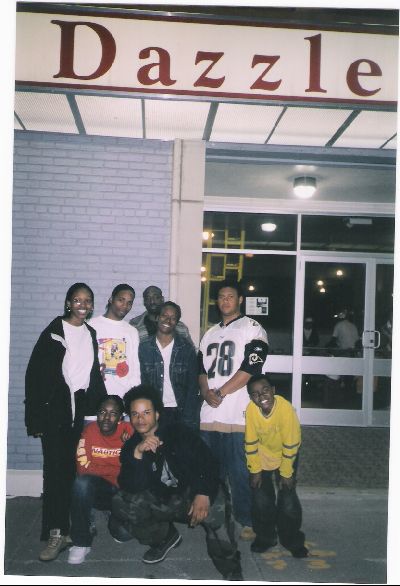
Striding both the past and future, the Dazzle Theatre, 112 Webster Ave., locates the “rebirth of coolâ€, just the sort of Harlem Renaissance-type venue Rochester was yearning for. While more attention will be given, in the coming year, to the bigger price budget items; the Spirit of Rochester and the Johnson-Brooks’ downtown Renaissance Square collaboration, it’s repertories like Dazzle Theatre and Michael A.A. Yawn’s IMANI Ensemble that will carry Rochester’s true spirit. 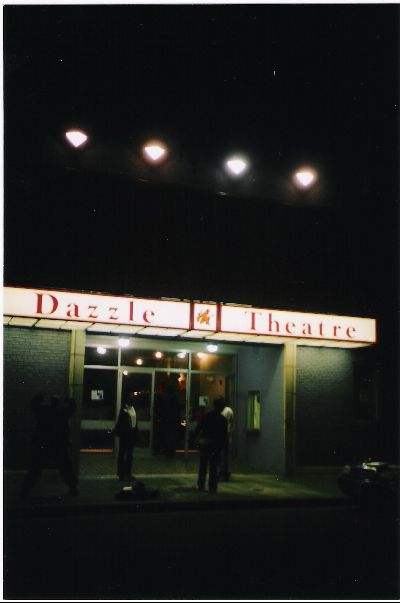
Given the ritzy-looking front on Dazzle Theatre, you almost expect guests to arrive in chauffeured Cadillacs, and to be dressed to kill in zoot suits and broad brimmed hats. Roll out the red carpet, Mr. Yawn has this theatre going like its name. A cross between Harlem’s Cotton Club and the Apollo Theater, the experience is indeed dazzling.
On a Saturday night, April 24 the bill is “The Homeboys,†a play written and produced by Yawn, a veteran of the Rochester’s theatre scene. The play begins with a poem, read by Yawn, titled “Doo-Rags and Beyond.†The poem’s author is Carol E. Owens, a Rochester poet and attorney at the Bullard Law Group. Her work introduces the theme of the play;
…from doo-rags to body bags –
is a tale of robbin’ the hood –
some wanna’ get rich real quick
by making vice and crime
look real good
the rat race is not in truth fully understood
from doo-rags to body bags…
(see below for complete text of "Doo Rags and Beyond" and author information)
Scene one is set on Thurston Rd., an actual street on the west side of Rochester. The “homeboys†are doing what homeboys do best - hanging out on the corner. But this play is not a victim of “ghetto†stereotypes. As the title suggests, the play is driven predominantly by male actors, though there are some very important female roles as well. 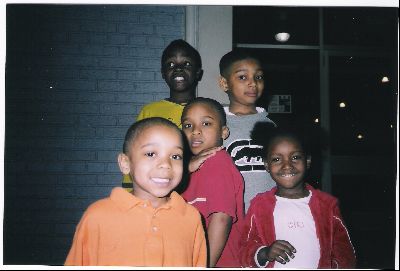
It is a youthful production, which along with its focus on impoverished, outcast teens, could be the black version of S.E. Hinton's The Outsiders. Instead of "greasers" and "socs," the Homeboys' blue bandanas suggests a "crips" versus "bloods" conflict. Because the play takes place on the west side of Rochester and examines the repercussions gang life has on families, comparisons to West Side Story might also work. But such a resemblance should not give the wrong idea. "The Homeboys" makes a tremendously important and unique statement all on its own.
While The Outsiders and other 1950's-60's era delinquent youth-themed pieces, such as Rebel Without a Cause, and The Blackboard Jungle, fit well with the counter-cultural social movement of that time, "The Homeboys" is atypical today. When movies like American Pie and Dude, Where's My Car, imitate accurately the absurd wonders of suburban white sprawl, Homeboys hits you with inner-city reality.
Even at the height of the 1950's-60's oppressed white-boy era, audiences could always digest these edgy accounts as an exception to the rule of WASP privilege and progress. Just as this genre of literature and film enjoy a distance from us in time, they are also entertaining as an oddity to the more commonplace affluence of the white experience in America. We now view these films and books much like we visit the circus or watch WWF, to see white people doing some crazy stuff or maybe we listen to Eminem.
Homeboys profoundly ruptures these comforts. For one thing, the setting is today. This is happening right now, you can't distance yourself from it (if you are black). It's almost as if the actors are too good at their roles. They know what it's like to be a "Homeboy".
“Yes when they acted these roles, they could feel it,†said Yawn. “Some of them are real close to it, but by doing this on stage they could turn their exposure to street life into a positive message.â€
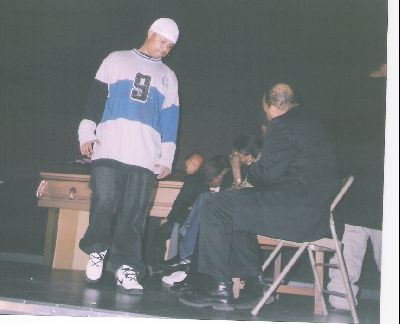
Yawn knows of at least one family that did not attend the play because they had experienced a death in their family the same week “Homeboys†ran and the themes and emotions presented were too familiar now.
On the program, the setting is listed as such:
Time: Present
Place: Rochester, New York
There is an urgency to this play.
Rochester is ranked 19 out of a 100 large-cities in America for having the highest crime rate. In 2003, 57 lives were lost as a result of homicide, the highest yearly total in Rochester since 1997. An alarming trend is the increased level of youth violence, involving the Dipset, Thurston Zoo, Plymouth Rock and other street gangs.
In the play, some of the characters talk about escaping the "ghetto" and moving out to "the burbs" and "making big paper.†Joe, played by Wilson High junior Anthony Martinez, is the leader of the "Homeboys". A college drop out, Joe claims he is "educated in the streets". While arguing with his mother Mrs. Maxwell, played by D'Lores Simmons, Joe laments about the state of black men.
"You can't make it unless you are a world class entertainer, athlete, or hustler."
Historically, 15- to 30-year-old males have represented the highest annual category of homicide victims. In 2003, 31 young men in this age group were killed. Another disturbing statistic is that more black men are in prison than in college. The Funding of Higher Education and Corrections and Its Impact on African American Men, reports that while 603,000 black men were in college in 2001, 791,600 were imprisoned.
Despite such realities, Joe's hustler life and love for his homeboys is at the continued expense of his family. The result is now his mother and father are fighting over what to do about their son. The father, Mr. Maxwell, played by Yawn, plans to put Joe out on the streets as a tough-love solution. Mrs. Maxwell strongly protests. "John, you don’t mean you’re going to put our son out. You're not going to give up on him that easily are you, you're not shutting the door on my son." 
These are lessons suburbanites could sure learn from. Rather than shutting the door and insulating themselves in their gated communities they could try to reach out and help those less privileged. While none of the members of the audience were white, Homeboys presents issues that white people in the suburbs, as well as the White House, need not distance themselves from.
“I wanted to break the easy assessment of why young people do what they do,†explained Yawn. “So often people assume that if a kid joins the gang his home life is a wreck. The single parent household, the mom on drugs – this is what is shown in the movies and broadcast on television. That is not the case in this play. The family is in tact, the sister is going to college, the parents are professionals and spiritual, and still Joe is drawn to the streets. The easy answer is to blame the parents, but the issue I wanted to confront is that you can have a family living correctly and still the lure of the streets can be stronger.†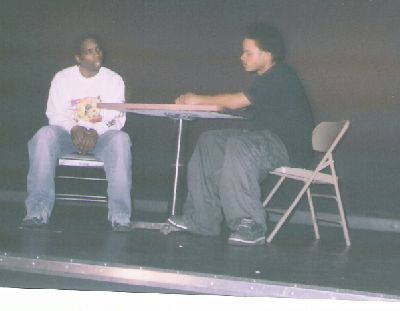
Producer Michael A.A. Yawn plans to take "The Homeboys" to wider audiences in juvenile detention homes and area high schools. Yawn is the founder of IMANI Theater Ensemble, which seeks to provide an opportunity for African American actors to study, rehearse and perform their craft. Yawn has appeared in at least twenty regional theatre productions. He received a fellowship from the Stage Directors Guild of New York City in 1996, for the position of Assistant Director of the Broadway play "Having Our Say" produced by Geva Theatre.
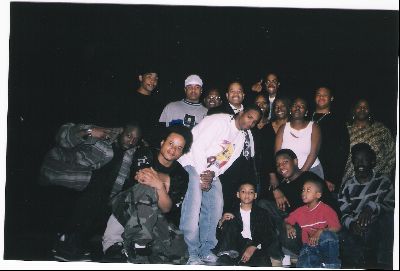
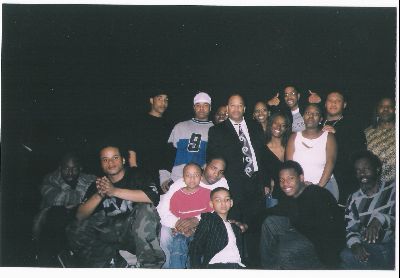
"The Homeboys" Cast: Anthony Martinez, Willis Anderson, Renell Edwards, Alphonso Lowry, Anthony Johnson, Irving G. Murphy, Chad Goff, Randy Greyson, Brandon Anderson, Tameka Moore, Sache'l Scott, Keion Edwards, Navaar Poole, Jabari Postell, D'Lores Simmons, Michael A.A. Yawn, Jabari Postell, Minister Clifford Florence of Central Church of Christ
Doo-Rags and Beyond
by Carol Elizabeth Owens
from doo-rags
to body bags
it’s a question
of rags to riches –
where an untamed
temper itches
thinking confidants
look like snitches
if you get too big
for small britches
and start
burning old bridges
from doo-rags
to body bags –
is a tale of
robbin’ the hood –
some wanna’
get rich
real quick
by making vice
and crime
look real good
the rat race
is not in truth
fully understood
from doo-rags
to body bags
old rules
are re-written
in new-skool code
as the forbidden
is no longer hidden
'decency' – peace out,
and good riddance –
who needs to seek out
sincere forgiveness?
we’s all ‘bout
gettin’ wit this,
and dabblin' in that
from doo-rags
to body bags
‘gimme whatcha got
to git me by –
gotta git
what i can
before you die’ –
it’s all about
“me, myself, and iâ€
from doo-rags
to body bags
a story of urban warfare
orphans left on welfare –
some well-to-dos
they never care:
and the doo-rag
isn’t about the flair
it gives your hair –
snatch it off?
do you even dare
to expose the lies
we prize weaving there?
curly, straight
natural or fake
how much more of this
craziness can we take?
let's "keep it real"
for sanity's sake
from doo-rags
to body bags
covering up
becomes a way of life
symbolizing struggle –
in ‘ghetto-fabulus’ style
bearing marks of strife
from doo-rags
to body bags
pants aren't the only
things that sag -
broken spirits
sometimes brag
as lost souls
flap in the breeze
like a tattered flag
who's that tugging
at my rag?
wanna' see what's
in my bag?
urban violence abides in
uncovered secrets
wrapped up in slick silence
while Black heads
are tied down tight–
and the only waves
being made at night
are on the scalp
instead of the brain –
doo-rags
to body bags
is about the pain
in seeing a bloodline
running insane –
a witness to young lives
going down a dark drain
the inner-city pity
isn't pretty and it
surely ain't no party -
it is more like a shame:
it’s not your
ordinary game –
from doo-rags
to body bags
be careful about
the type of fame
you seek to claim
© 2003 Carol Elizabeth Owens
[all rights reserved]
Carol Elizabeth Owens is a Black/African-American woman, who is an attorney and counselor-at-law at the Bullard Law Group in Rochester, New York. She is a graduate of Howard University - School of Business (Bachelor of Business Administration -- Computer Based Management Information Systems), and Albany Law School (Juris Doctorate).
Owens says "I began writing poetry before becoming a teenager, and I have continued to write whenever the mood strikes and time permits. To me, poetry is the art of breathing life into the written word; to connect the mind with the soul as it is read, or heard.
It was a privilege to have Mr. Michael Atkins Yawn feature "Doo-Rags" with his theatrical work!"










